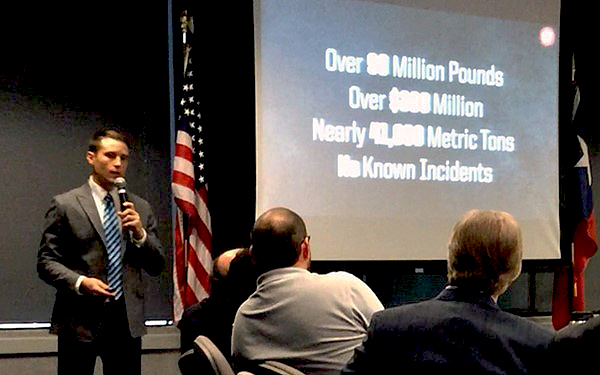
By Chris Finley, Digital Engagement Analyst
Uneaten food is worth an estimated $165 billion per year in the US. That’s a lot of money. A lot of food waste. A lot of methane released into the atmosphere. A lot of bad things. While this is a national level-problem, we here in North Texas are concerned with the issue.
About a month ago I was fortunate enough to not only attend, but also speak at a local food recovery event. Environmentalists, city leaders, government organizations, food banks, concerned citizens, and others converged to discuss this pressing issue at the DFW Area Food Recovery Event. We discussed what food recovery means for our local economy, our environment, our social systems, and what can we do to improve our recovery practices.
The Environmental Protection Agency (EPA) asked me to speak because of Pizza Hut’s recent Green Team sustainability efforts, specifically the food donation series that Tori organized. I happily obliged. Throughout the presentation I talked about a personal past experience in Jamaica, staying with a local in Montego Bay and seeing him eat faster than anyone I’d ever seen. I briefly talked about trips through remote places and embracing nature. These experiences have molded me to care about the environment and communities as much as I do today. I fundamentally believe that while it’s important to know WHAT you are doing, it’s far more critical to know WHY you’re doing that something.
As Pizza Hut is largest pizza company in the world, you can imagine we make a gigantic splash in the world of food recovery. Our flagship platform is Harvest, a donation program that has fed local communities since 1992. Errors, no shows, and leftover buffet items eligible for donation from our restaurants are safely packaged and stored to health code specs and picked up by local food banks and charities, and then distributed to families living in the area. To date, Pizza Hut’s Harvest program has donated over 90 million pounds of food holding a fair market value of $390 million. [Editor’s note: stay tuned for more information on our Harvest program!]
To summarize, the food recovery event was a superb experience; I appreciated being surrounded by like-minded people and was grateful for the opportunity to share Pizza Hut’s slice of the pie. I learned from municipality leaders, health inspectors, EPA representatives, businesses, schools, and composters. Networking led to relationships and more speaking opportunities to spread the word on how Pizza Hut is feeding people, not landfills. I am confident that the engaged attendees of the DFW Area Food Recovery Event are ready to tackle current and future food waste obstacles together.
PS: If you have leftover Pizza Hut 1) place leftovers in fridge 2) reheat OR eat cold 3) enjoy your food with a full belly knowing you did not contribute to food waste.
#PlanoGreenTeam

